Kenko Pro1D+ CPL filter review: blue skies ahead
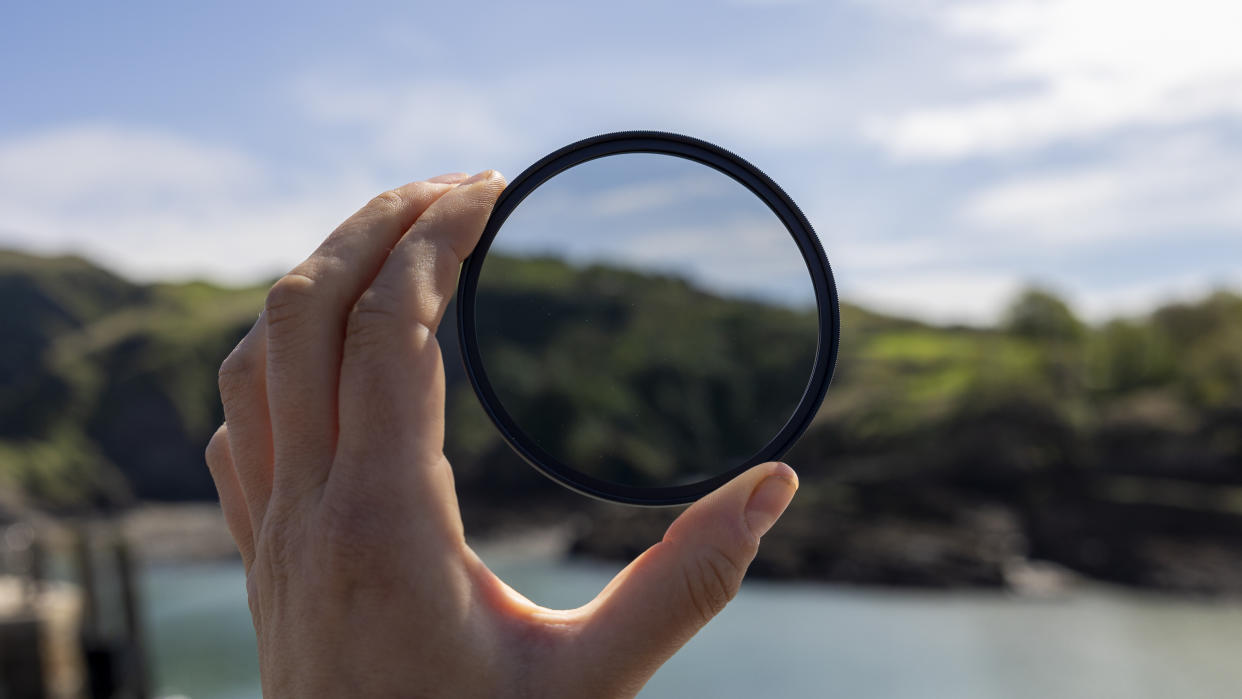
You can successfully recreate the look of many filters in post-processing, but a polarizer is something you need to have on your camera at the time of capture. I've used the best polarizing filters for decades, mainly for enhancing the colors of landscapes or adding contrast during unavoidable shoots in the midday sun when the vibe is washed out. Circular polarizers are designed to filter out polarized light, and by doing so they reduce or remove reflections from shiny surfaces like water, glass, and metal. They can have a practical as well as creative use case.
Traditionally, you'd buy a circular polarizer, screw it onto the end of your lens thread and then unscrew it when you're finished. This approach isn't complicated, but it can take time – time that might mean you're missing out on moments and other filters. That's where Kenko's Pro1D+ CPL filter comes in.
As part of the manufacturer's Instant Action range, this round filter doesn't have a thread but instead attaches to your lens with a magnetic adapter that comes in the box. The adapter also works with other filters in the Pro1D+ range, including a UV Filter and Variable ND filter, to give you an arsenal of exposure-controlling accessories you can swap in and out rapidly. Or stack on top of each other.
This filter system is completely new for Kenko – a brand that has been making reliable, middle-of-the-road filters for decades. But does the magnetic design add to the performance or detract from it? I tested the 82mm version (on and off) for several weeks on my Canon RF 24-70mm f/2.8L IS USM lens to find out. If you're looking for a polarizer to cut down reflections and give contrast a boot, read on to discover whether the Kenko Pro1D+ CPL is the right fit for you.
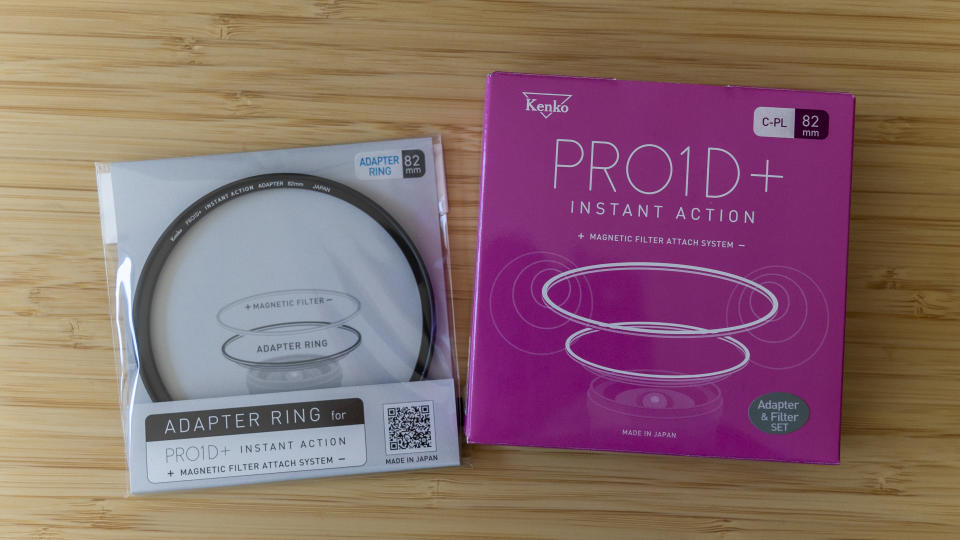
Kenko Pro1D+ CPL filter: Specification
Kenko Pro1D+ CPL filter: Price
Kenko's Pro1D+ filter lineup is middle of the range in terms of price, and its CPL filter is no different. I've seen plenty of cheaper non-magnetic options, but these don't offer the water-repellent or anti-stain coatings as Kenko, or the added adapter ring.
The only thing that makes me question the value for money here is that Urth's professional Magnetic CPL Polarizing Filter Plus+ is priced similarly, but features German-made SCHOTT glass (Kenko doesn't share how its glass is manufactured) and offers a lifetime warranty. And in terms of protection, Kenko only gives you a cheap plastic container with some very thin foam, while Urth offers a premium-feeling metal tin.
Kenko Pro1D+ CPL filter: Design & Handling
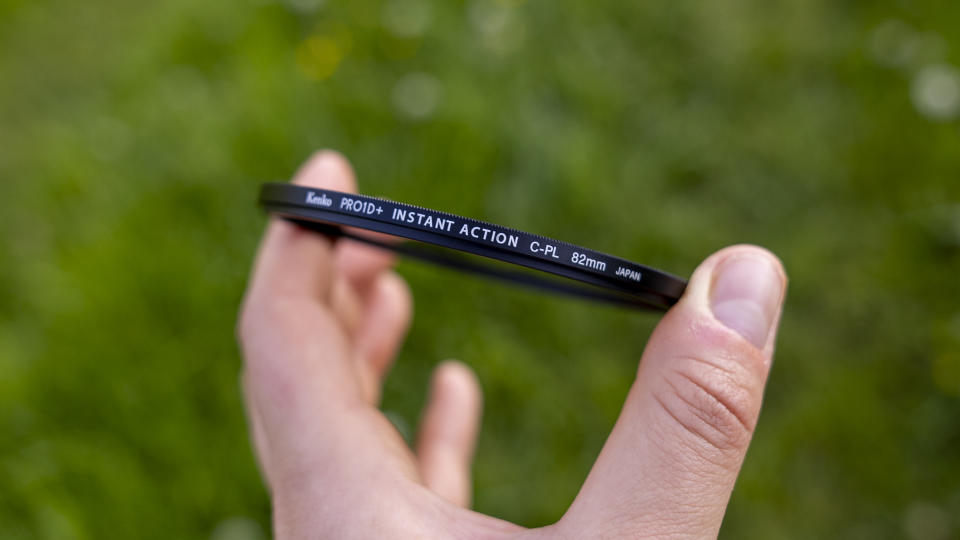
Like all the filters in the PRO1D+ Instant Action range, the C-PL comes in a brightly colored, square cardboard box. Inside this pleasingly pink box is the polarizing filter (in a round protective plastic case) and a filter adapter matching the thread size. I don't think you need instructions to use a polarizer, but there are some simple line diagrams on the back of the box showing that you need to screw on the adapter ring first and then pop the filter on top.
Having already tested the PRO1D+ UV filter, I already had the adapter ring attached to my Canon RF 24-70mm f/2.8L IS USM lens and was able to remove that and attach the C-PL in its place within seconds. In that respect, it definitely lived up to the "Instant Action" Name. I was pleased to find that the filter was machined to fit snugly within the adapter and although there's a minuscule amount of give around the outside, it didn't feel loose or rattle around as some magnetic versions can do.
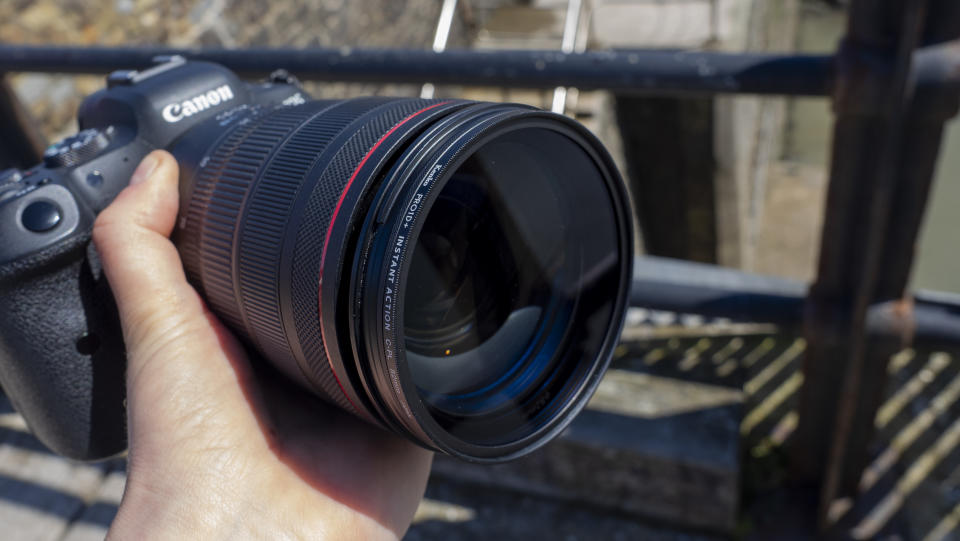
I was pleased to be able to stack this polarizer with other filters in the Pro1D+ range and didn't find the level of magnetism tweaked when I had two filters attached simultaneously. If anything, the bond was stronger. On the downside, the polarizer isn't designed to accommodate a lens cap on top, and this meant I had to remove it every time I put your gear away. Given how quick the filter is to remove this isn't a dealbreaker, but it does add a few seconds to your workflow and can be fiddly if you're short on hands or juggling equipment.
As for polarizing operation, the filter's knurled edge makes it easy for you to get a handle on it. But I found it unpleasantly scratchy to turn in the adapter, with an annoying grating sound that sounded as if it was causing damage (it wasn't). We found the same problem while testing the Urth Magnetic Circular Polarizer, but it's not something you encounter with screw-in rotating CPL filters. If you're a professional needing an incredibly precise filter rotation this might put you off, but otherwise, it was easy to see the effects of the polarizer through the viewfinder and on my camera's LCD screen.
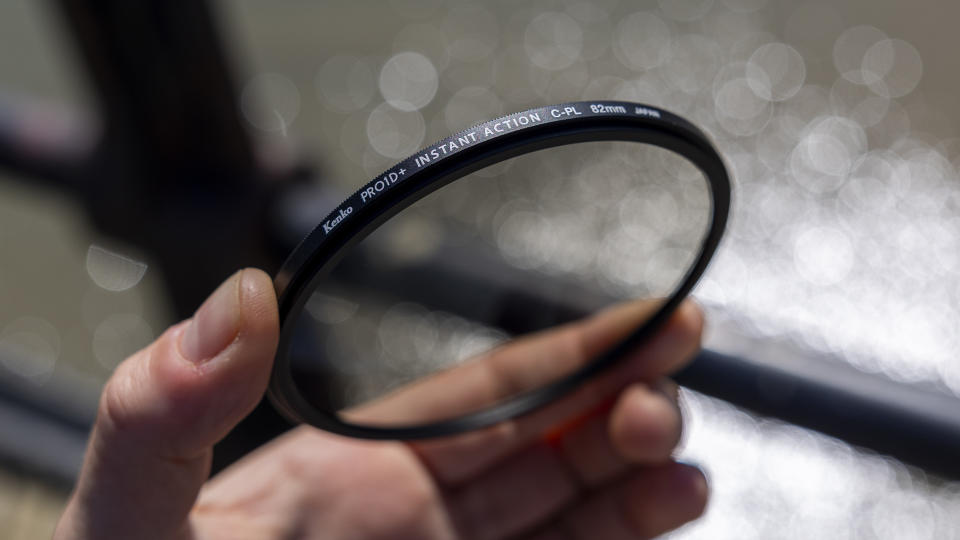
Kenko Pro1D+ CPL filter: Performance
Despite the Pro1D+ CPL design making the filter's rotation slightly janky, I have very few complaints about its effect on images and the quality that it gives you overall. With some polarizers, I've found it hard to tell whether the filter is having an effect, and which way I need to turn it. Not so with the Kenko Pro1D+. It's immediately obvious when the filter is at maximum strength – both through the viewfinder and the LCD screen – and I could see the sky darkening in real time.
If I were being picky, I'd say the contrast is slightly less natural than Urth's magnetic CPL, but only by a whisper. I made sure to test the filter on a very bright, sunny day, and it added a real punch to blue skies, elevating the white fluffy clouds and reducing reflections in the ocean. Overall, this gave me much more detail when processing the images (the before and after shots below haven't been edited).
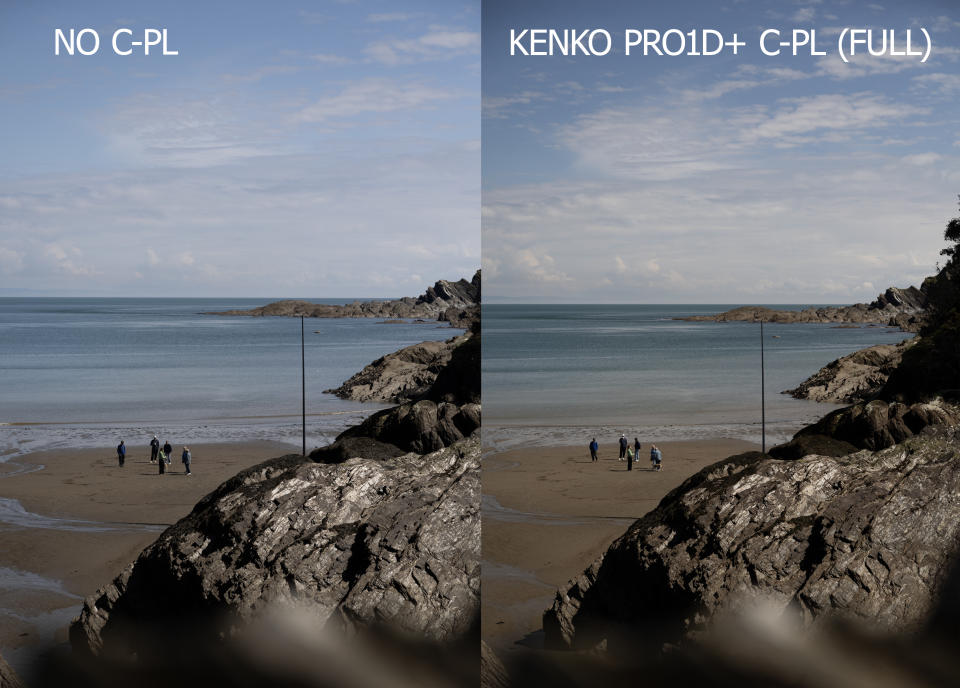
On another test, I wanted to trial the CPL's reflection-reduction capabilities (try saying that quickly) specifically, and I pointed it at a tributary of water that had run into the harbor from the sea. With a quick twist around, I was amazed to see that it had cut out the reflections from the water almost entirely. This isn't the most aesthetically pleasing shot, but it proves how well the filter does its job.
I used an Auto White Balance for all my testing and didn't notice any color casting caused by using the filter. Some polarizers cause a cool cast, which is easy to fix in post but shouldn't be the case when spending more on a filter. The light transmission and overall sharpness were unaffected too, and I felt very confident using the filter in a range of conditions.
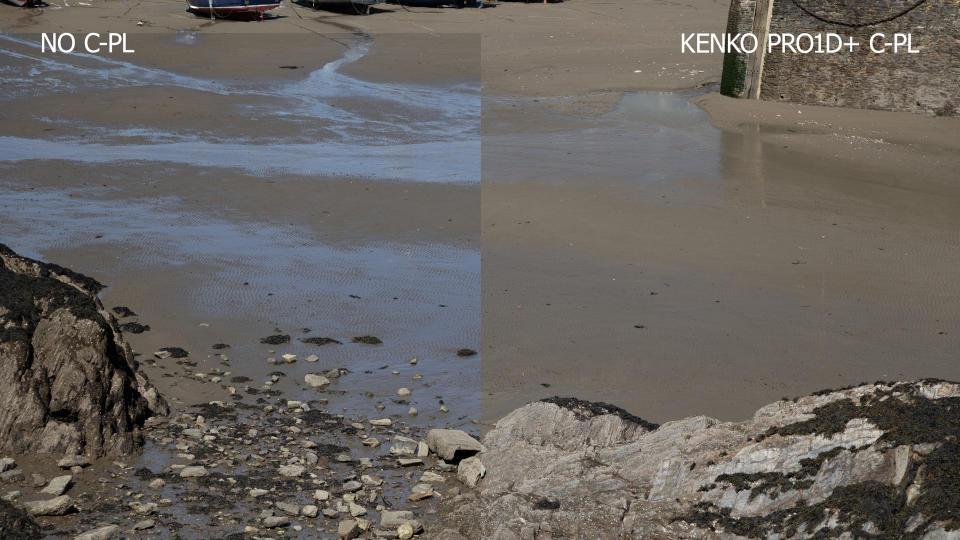
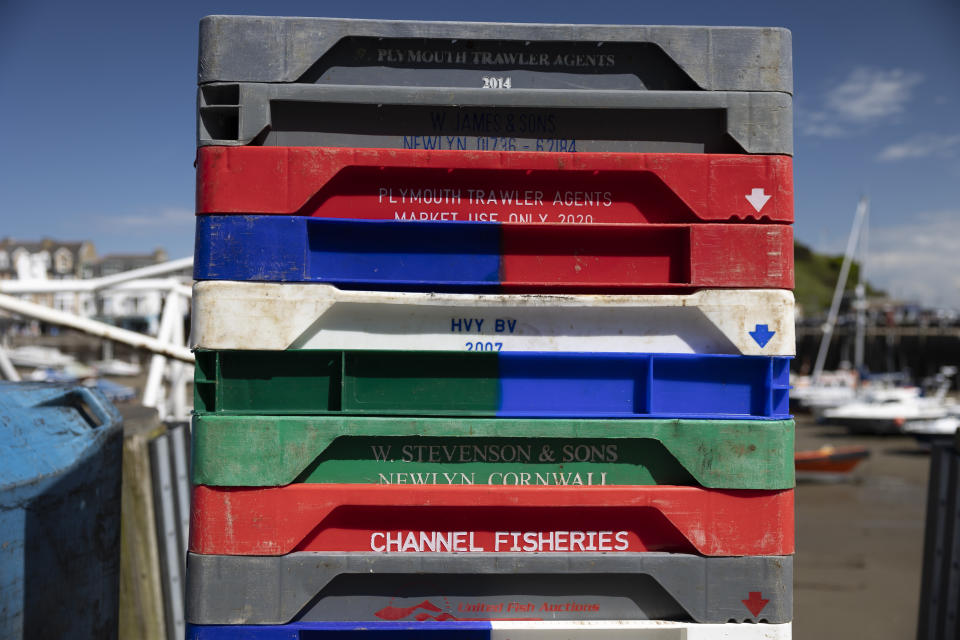
Kenko Pro1D+ CPL filter: Verdict
If I grade the Kenko Pro1D+ CPL filter purely on its polarizing powers, I'd say it was almost an entirely positive result. While its polarization effect might be a bit intense and overcooked for some photographers, the fact it doesn't noticeably degrade or change the lens quality is a real relief.
The magnetic design is the real selling point of the Pro1D+ CPL over other Kenko filters or indeed, cheaper choices. So is it worth it? Yes, for swiftly removing or mounting the polarizer and stacking it with other filters in Kenko's Pro1D+ Instant Action range. However, I think brands are still struggling with making rotational filters that are both magnetic and smooth in operation. I found the scraping noise of the Pro1D+ CPL slightly annoying, and while it didn't affect my picture quality, it did hinder my overall enjoyment.

✅ Buy this if...
You've got other Kenko Pro1D+ filters and want to stack them together.
You change filters a lot and want a quick way to remove them.
🚫 Don't buy this if...
You want the smoothest rotation movement – this CPL has friction.
You're on a budget; the Kenko is well-priced but it's not a cheap option.
Kenko Pro1D+ CPL filter: Alternatives
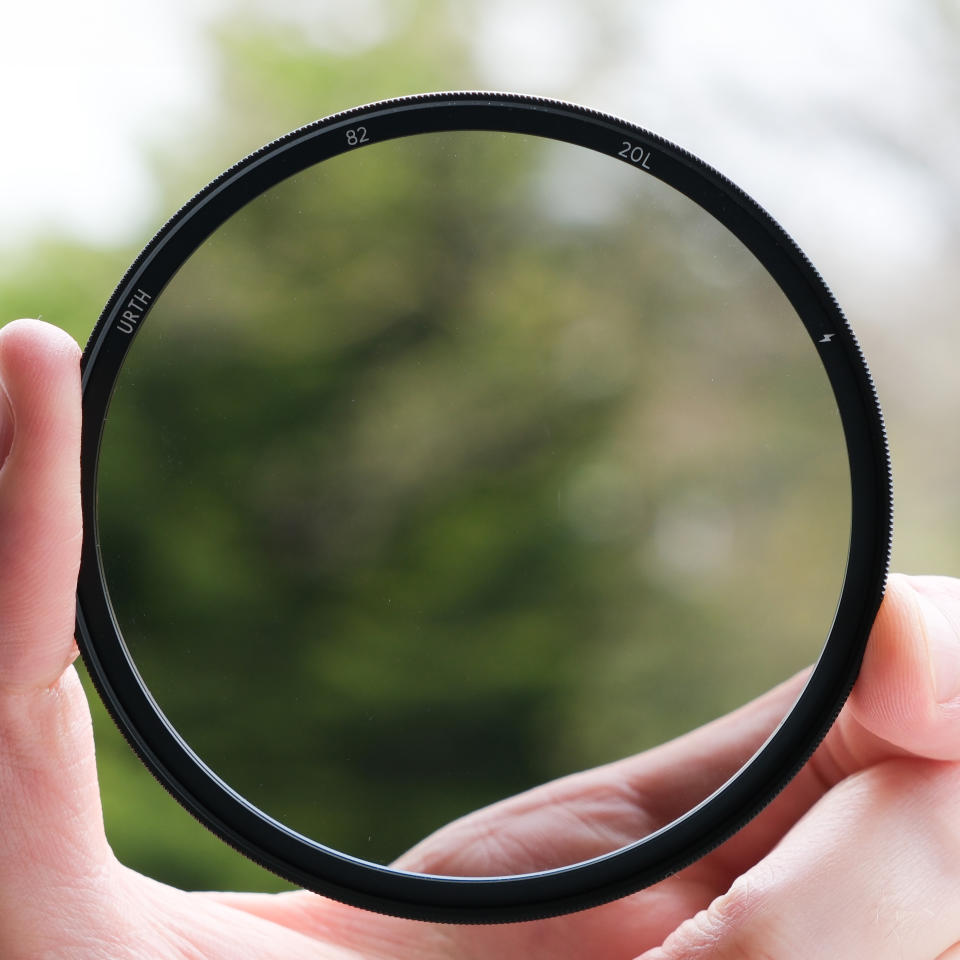
Urth Magnetic Circular Polarizing (CPL) Lens Filter (Plus+)
Urth's magnetic design also isn't perfect, but it gives a distinct polarization effect that's even more pronounced than the Kenko PRO1D+. The company has eco-friendly kudos, with trees planted for every purchase.
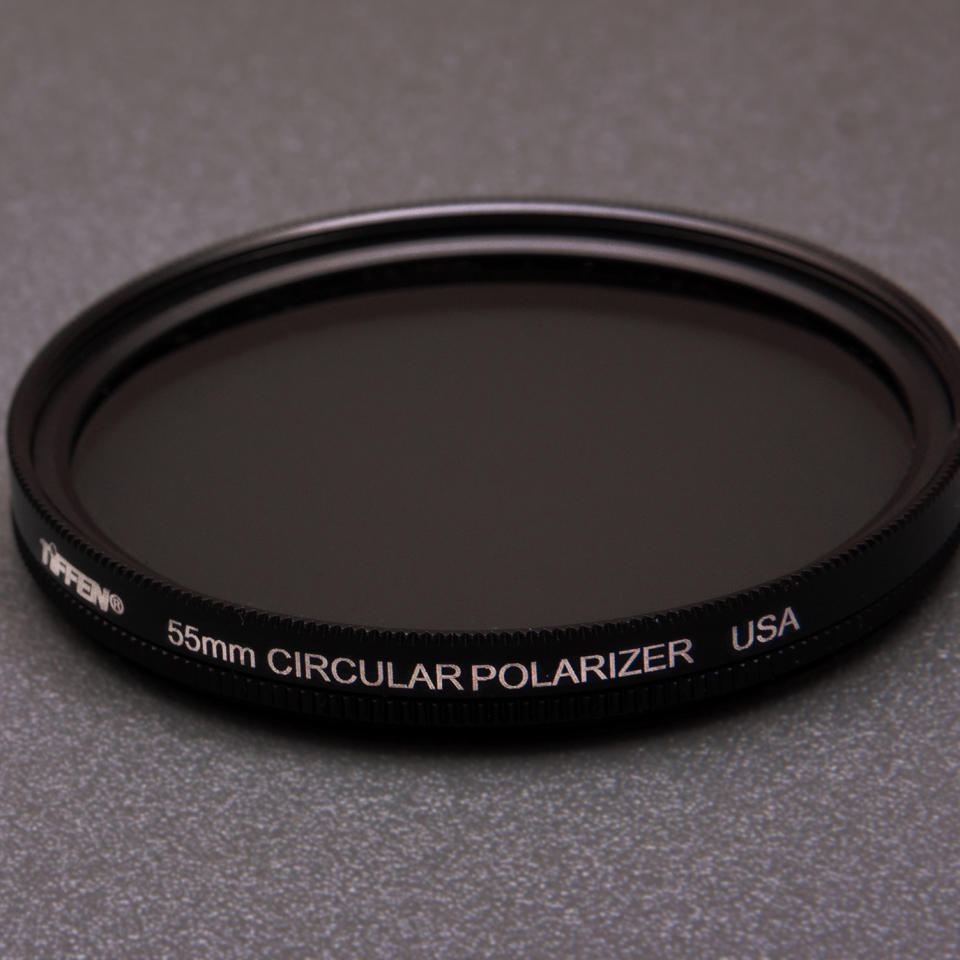
Tiffen Circular Polarizer review
Tiffen's polarizer is a cheap and cheerful option offering great value for money. It does what a good polarizer should, enhancing colors and contrast, and although it produces a slightly cool color cast, this is easily fixed.

